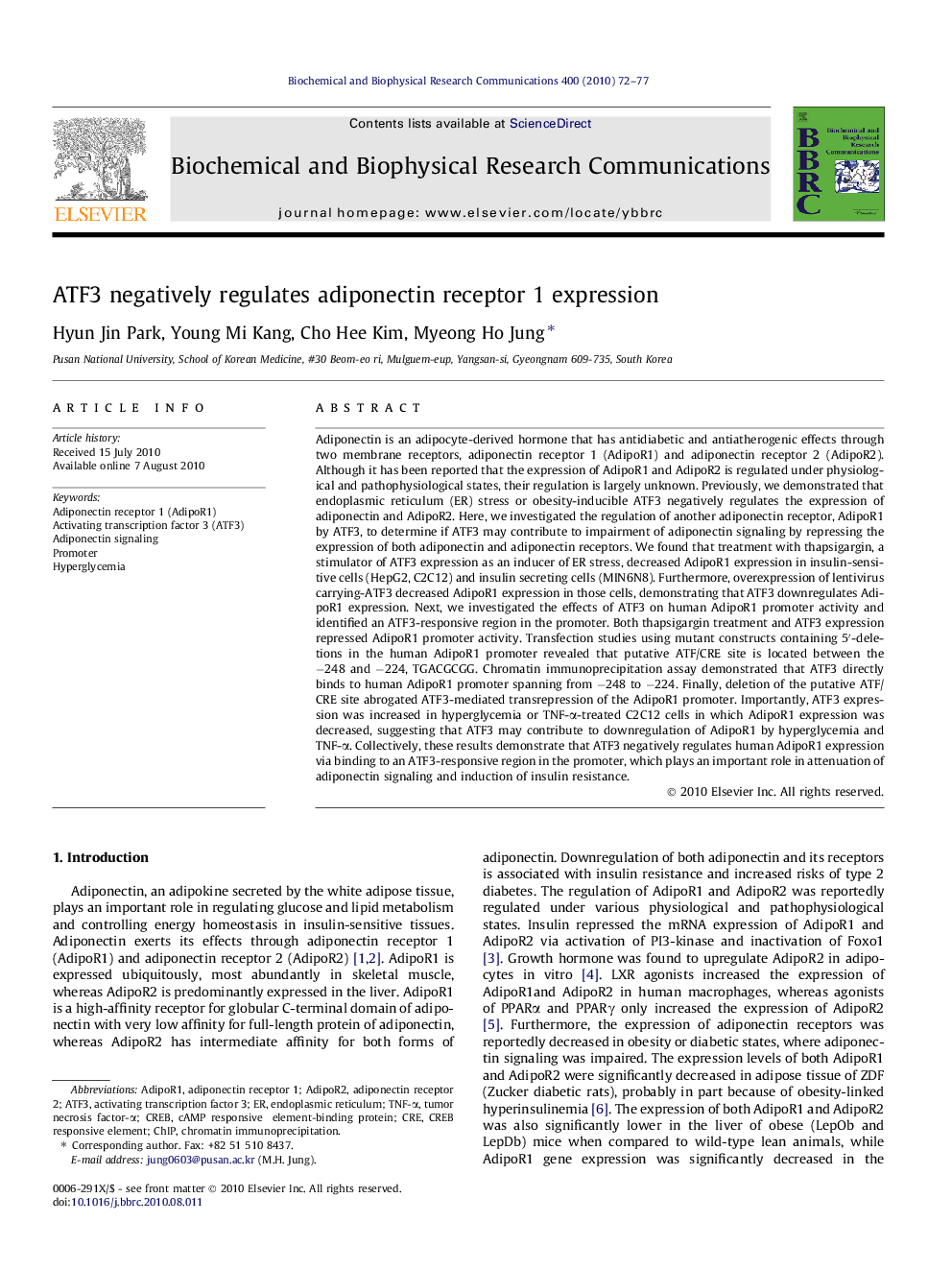| کد مقاله | کد نشریه | سال انتشار | مقاله انگلیسی | نسخه تمام متن |
|---|---|---|---|---|
| 1931427 | 1050552 | 2010 | 6 صفحه PDF | دانلود رایگان |

Adiponectin is an adipocyte-derived hormone that has antidiabetic and antiatherogenic effects through two membrane receptors, adiponectin receptor 1 (AdipoR1) and adiponectin receptor 2 (AdipoR2). Although it has been reported that the expression of AdipoR1 and AdipoR2 is regulated under physiological and pathophysiological states, their regulation is largely unknown. Previously, we demonstrated that endoplasmic reticulum (ER) stress or obesity-inducible ATF3 negatively regulates the expression of adiponectin and AdipoR2. Here, we investigated the regulation of another adiponectin receptor, AdipoR1 by ATF3, to determine if ATF3 may contribute to impairment of adiponectin signaling by repressing the expression of both adiponectin and adiponectin receptors. We found that treatment with thapsigargin, a stimulator of ATF3 expression as an inducer of ER stress, decreased AdipoR1 expression in insulin-sensitive cells (HepG2, C2C12) and insulin secreting cells (MIN6N8). Furthermore, overexpression of lentivirus carrying-ATF3 decreased AdipoR1 expression in those cells, demonstrating that ATF3 downregulates AdipoR1 expression. Next, we investigated the effects of ATF3 on human AdipoR1 promoter activity and identified an ATF3-responsive region in the promoter. Both thapsigargin treatment and ATF3 expression repressed AdipoR1 promoter activity. Transfection studies using mutant constructs containing 5′-deletions in the human AdipoR1 promoter revealed that putative ATF/CRE site is located between the −248 and −224, TGACGCGG. Chromatin immunoprecipitation assay demonstrated that ATF3 directly binds to human AdipoR1 promoter spanning from −248 to −224. Finally, deletion of the putative ATF/CRE site abrogated ATF3-mediated transrepression of the AdipoR1 promoter. Importantly, ATF3 expression was increased in hyperglycemia or TNF-α-treated C2C12 cells in which AdipoR1 expression was decreased, suggesting that ATF3 may contribute to downregulation of AdipoR1 by hyperglycemia and TNF-α. Collectively, these results demonstrate that ATF3 negatively regulates human AdipoR1 expression via binding to an ATF3-responsive region in the promoter, which plays an important role in attenuation of adiponectin signaling and induction of insulin resistance.
Research highlights
► ATF3 decreases AdipoR1 expression in liver, skeletal muscle and pancreatic β cells.
► ATF3 represses promoter activity of human AdipoR1.
► ATF3 binds to AdipoR1 promoter spanning from −248 to −224.
► ATF3 contributes to downregulation of AdipoR1 by hyperglycemia and TNF-α in C2C12.
Journal: Biochemical and Biophysical Research Communications - Volume 400, Issue 1, 10 September 2010, Pages 72–77